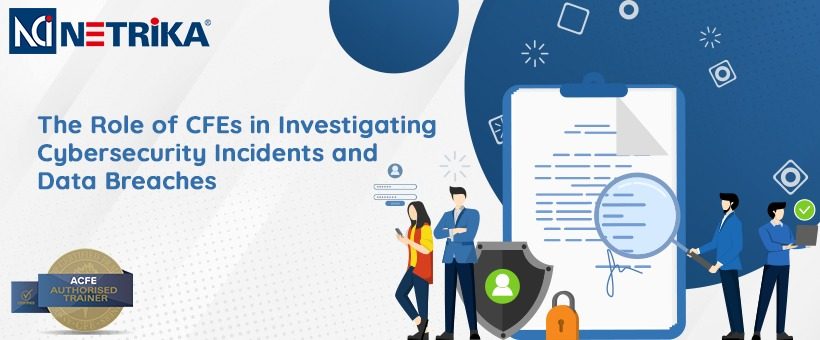News & Events
The Role of CFEs in Investigating Cybersecurity Incidents and Data Breaches
- June 28, 2024
- Posted by: marketing@netrika.com
- Category: Blogs

Role of CFEs in Investigating Cybersecurity
Today’s businesses are threatened by cyber security incidences and data breaches that affect all small, medium, and large-sized organizations. As certified fraud examiners (CFEs) are equipped with fraud prevention detection and investigation skills and they play a major role in dealing with these issues.
In this blog post, we will discuss the significance of CFEs in investigating cybersecurity incidents & data breaches as well as some of the steps they take to reduce risks and safeguard an organization’s financial position or reputation.Read more.
Role of CFEs in investigating cybersecurity incidents and data breaches
Understanding Cybersecurity Incidents and Data Breaches: There are a myriad of cybersecurity incidents that include unauthorized actions impacting the confidentiality, availability, or integrity of digital assets. These incidents include malware attacks, phishing scams, and ransomware infections which exploit and expose sensitive information of organizations including customer data, intellectual property, or financial records. Understanding these threats is crucial to diving deep and preventing them from occurring or limiting their adverse effects on organizations.
Identifying Indicators of Fraud and Malicious Activity: CFEs apply their knowledge and skills in fraud examination to identify potential indicators of fraudulent activities in computerized environments such as; examining access logs for activities by unauthorized users; analyzing system logs for signs of unauthorized file access or data exfiltration; analyzing network traffic for anomalies and unusual patterns. They can effectively detect and investigate cybersecurity incidents and data breaches by understanding the tactics, techniques, and procedures used by cybercriminals.
Conducting Forensic Investigations: When a cybersecurity breach is encountered, CFEs undertake forensic investigations to determine the cause, scope, and effect of such an incident. This includes the collection and preservation of digital evidence that may exist within systems that have been attacked. The next step is to examine malware samples taken from the system before finally carrying out time reconstruction based on log analysis and traffic monitoring.
Collaborating with Cross-Functional Teams: CFEs are skilled at collaborating with cross-functional teams such as risk management experts, IT professionals, legal counsels, and law enforcement firms to create a proactive response to cybersecurity threats and breaches. They leverage the knowledge of their team, technological best practices, and tools to design response plans, implement remediation measures, and ensure regulatory compliance per the industry standards. This also ensures strategic decision-making to mitigate potential financial and reputational repercussions.
Implementing Preventing Measures: CFEs design proactive cybersecurity threat prevention measures to aid in improving the security posture of an organization. These measures include risk assessments, designing security policies, implementing access controls, and supporting employee training.
Certified Fraud Examiners leverage cutting-edge technologies and tools to develop cybersecurity investigation strategies that are robust enough to detect, investigate, and mitigate cyber threats, and protect organizations from reputational damage, financial loss, and legal liabilities.

